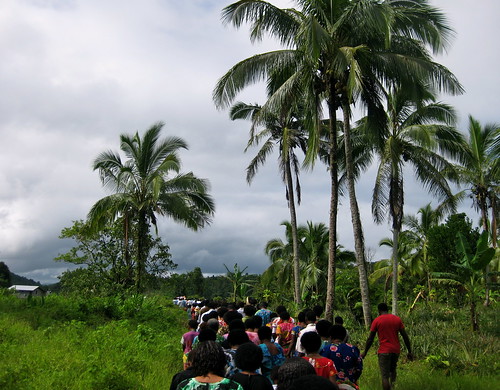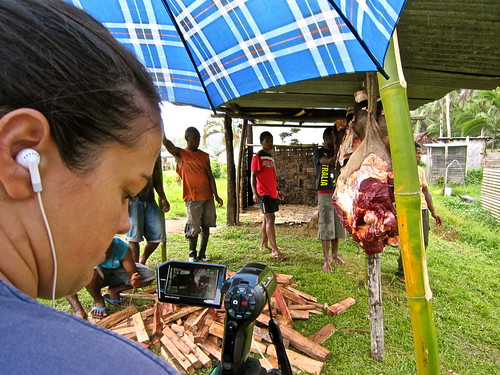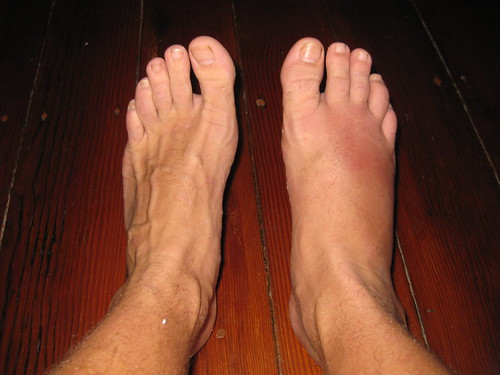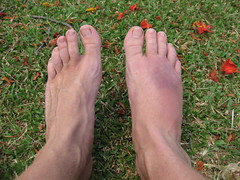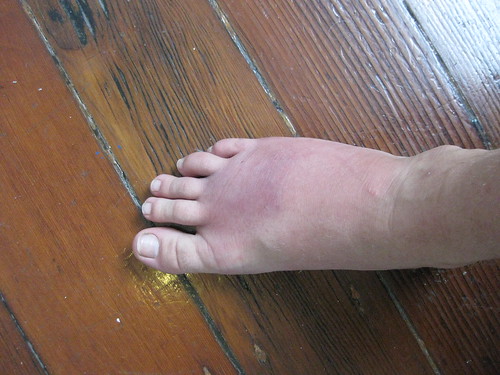The road to the village was still impassable over Namado, so at 5:30am, Lindsay and I walked the longest, darkest, most painful kilometer of my life. Wearing Crocs and using the side of my foot, I hobbled as fast as I could to reach the carrier on time. We parked in Suva at 10:30am, and the carrier was bound for the village three hours later. We booked it to the Suva Private Hospital.
With Lindsay on my arm, we flew via taxi to the medical center and, within twenty minutes, saw a doctor. Medications were prescribed, and for less then $25 USD, I was free to go - with one exception. The doctor asked me to stay in Suva for at least three days to make sure the infection did not spread or worsen.
Jackie was expected in three days, and Lindsay wanted to make sure everything was set in the village and that classes continued. For the first time on our trip, Lindsay and I parted ways.
The Suva Stuff
I sat in a coffee shop, searching frantically for a place to stay. My mind's monologue was endless. I was by myself, thousands of miles from home. I had an infection in my foot, and it was starting to travel up my leg. What if the medication didn't work? What if I have to have my leg removed? Would Fiji really be the place to seek medical help? Will my travel insurance cover amputations? Where can I stay that won't cost me an arm and a leg...
I found the South Seas Hotel for $7 USD a night. Though lacking in most creature comforts, I was happy to have the small bed and ceiling fan. I slept a lot. The infection completely wiped me out. I rested up, let myself heal, and prepare for our final month in the village and the arrival of Jackie, our first Nakavika Project participant. After almost two days, I could walk with a small limp, which allowed me to explore the capital city. I took in the epic cinematic masterpiece of Avatar - an interesting contrast to rural village life.
After those two days, I missed Lindsay, my foot improved - thanks to some Ciprofloxacin - and I was mobile enough to surprise our guest a day early at The Uprising.
The Practical Stuff
What would you do if your trip was interrupted by an injury? Do you have the knowledge to take care of yourself or your travel companion?
Here are a few tips that will help you prepare in case of an emergency.
- Travel Insurance. GET IT. Not only is it extensive, but it's reasonably priced. I recommend World Nomads.
- Be prepared. Know about the necessary immunizations for every destination but also think about bacterial infections. You may have a cut that never heals because of bacteria in the air, water, dirt, or inside your body. This is caused by poor hygiene (sometimes you can't help it), unclean water, and food.
- Bring enough or always have handy some sunscreen, aloe, band aids, antibacterial ointment, Pepto-Bismol, Immodium, and pain relievers. Water purification tablets aren't a bad idea either, and it's best to bring them from home to avoid the search abroad.
- Don't forget to hydrate! Drink water...'nuff said.
- Bring some supplements. I eat a terrible diet on a budget. In Europe, I went through one country on bread and Nutella.
- Notify the U.S. Embassy that you will be visiting their country. This will bring you up-to-date information about the country and provide valuable information in case of emergencies.
- Learn through IAMAT where the best and nearest traveler-friendly hospitals are in your destination countries.
httpvhd://www.youtube.com/watch?v=9P_2iuMDRHo
Have you had a similar occurrence on the road? A bad health problem you had to figure out or brave traditional remedies to try and fix? Share this post if you found it interesting or helpful, and comment your experiences/opinions below!





